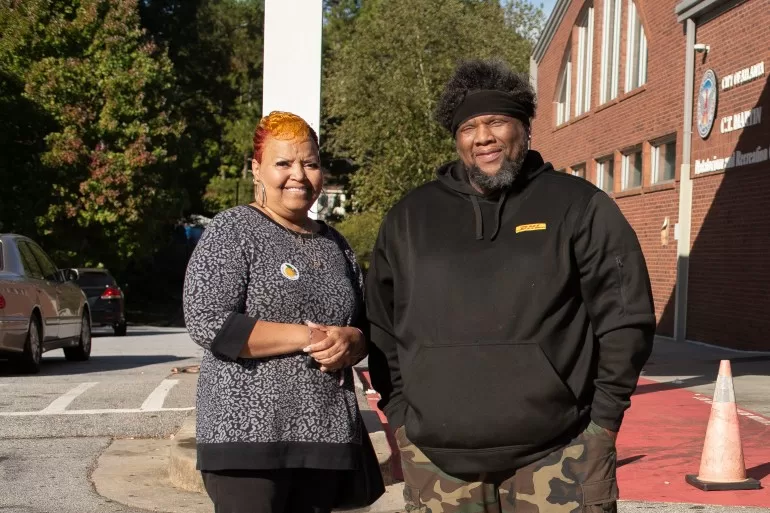In the cold light of day, on a crisp morning of early voting at CT Martin Natatorium and Recreation Center in southwest Atlanta, Black voter after Black voter pointed to any number of reasons they saw another Trump presidency as unacceptable.
That included Trump’s past cosiness with far-right and white supremacist groups, his election denialism, his racially tinged attacks on adversaries, his claim that Haitian migrants were eating pets or even his ham-fisted pledge to protect “Black jobs”, to name a few.
“To me, we only had one choice, and that was Kamala,” said Carolyn Sanders, a retired telecommunications worker. “We can’t go back to the racism, the hurting people.”
Her son, 47-year-old truck driver Detoine Sanders, added: “And it was blatant. We understand that this country has racism, based on the systems it was found on, [slavery], but people were really just coming out and saying what was on their mind.”
Other voters in Atlanta, a city studies show continues to have some of the highest rates of racial and economic inequality in the country, struggled to see why Trump was being viewed as better for the economy – and working people – than Harris.
While the Biden administration, for which Harris serves as vice president, has struggled with inflation and higher prices on basic goods than those seen under Trump, both Harris and the former Republican president have laid out populist-leaning economic proposals aimed at winning the votes of working Americans.
Harris has vowed to create an “opportunity economy”, which would include a first-of-its-kind ban on price gouging, extra assistance to first-time homebuyers, child tax credits and increased taxes on corporations – with cuts for the middle class.
Most recently, she laid out an economic proposal specifically aimed at Black men – another first – that would offer special loans to Black entrepreneurs, seek to address health issues that disproportionately affect Black men, and federally legalise marijuana.
For his part, Trump has vowed to end taxes on tips, Social Security and overtime, while imposing more tariffs to force corporations to manufacture inside of the US.
Echoing President Obama, 43-year-old Carla Travis, an office manager who voted with her wife, said she believed Harris – the former top prosecutor of California – is receiving extra scrutiny as a Black woman. Travis was adamant that a Black man in Harris’s position would not see the same softening of support.
“Sexism exists, and unfortunately it’s a reality in our community,” she said, adding that both parties have struggled to speak to the complexities of the overlapping perspectives of Black identity.
Squinting in the morning sun, voter Kyle Poag, a 31-year-old truck driver, said he had little faith either candidate would make a meaningful difference in his life, but he decided to vote “to assert what little influence I can in this messed-up system”.
He declined to say who he voted for, but added: “I understand why some people might [have voted for Trump], but there are things that are more important than dollars.”
In nearby Gwinnett County, part of the swiftly diversifying sprawl of Atlanta’s wider metro region, 30-year-old Brandon Davenport said a single policy point won his vote, and would have done so regardless of the candidate’s race or gender.
“I’m always working, and I’m always trying to put in extra hours of overtime,” said Davenport, who works in a tire shop. “I’m not saying that everything he said is dead on the money, but [Trump] got me on the overtime tax cut.”
